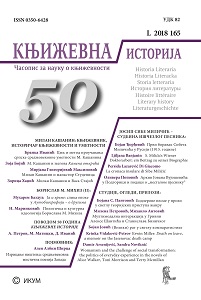Womanism and the challenge of social transformation: the politics of everyday experience in the novels of Alice Walker, Toni Morrison and Terry Mcmillan
Womanism and the challenge of social transformation: the politics of everyday experience in the novels of Alice Walker, Toni Morrison and Terry Mcmillan
Author(s): Sandra V. Novkinić, Damir ArsenijevićSubject(s): Serbian Literature
Published by: Институт за књижевност и уметност
Keywords: womanism;transformation;“double otherness”;matrilineality;motherhood;
Summary/Abstract: This essay analyses the ways in which womanism, as a movement and ideology that opposes marginalisation of African American women within dominant trends in feminism, has inspired African American women authors of different generations to conceptualise and problematize social transformation. In particular, the analysis focuses on the novels The Color Purple (Alice Walker), Beloved (Toni Morrison) and Who Asked You? (Terry McMillan). The essay argues that the tenets of womanism in these novels are embodied through the presentation of specific experiences of “double otherness“, matrilineality, and motherhood. In exploring the specific materiality of “double otherness“, motherhood, and matrilineality, as everyday experiences of African-American women, the authors of this essay argue that, based on the multiple and complex challenges facing African-Americans, womanism has created a framework for these women of shared, common goals. Reading the novels of Alice Walker and Toni Morrison through the lens of womanism enriches the discussion of the struggle against double discrimination – racism and sexism – in that it is shaped and articulated as a struggle whose main goal is social transformation that begins with the strengthening of the African-American community through confronting domination over women. Comparative analysis of the selected novels of Alice Walker and Terry McMillan highlights the notion of healing and examines the effectiveness of the specific experience of matrilineality and motherhood in the construction of the identity of black women such as is necessary for social transformation along womanist lines.
Journal: Књижевна историја
- Issue Year: 50/2018
- Issue No: 165
- Page Range: 259-272
- Page Count: 14
- Language: English

